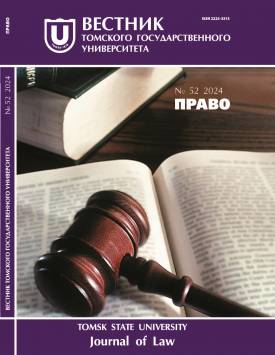The constitutional principle of freedom of work in emergency conditions: old problems and new challenges
The purpose of this scientific article was to identify theoretical and practical problems that arise in the process of implementing the principle of freedom of work in a state of emergency, the presence of an emergency situation and the introduction of a high-alert regime. The task is to outline ways to eliminate contradictions in labor legislation and law enforcement practice. To achieve this goal, the scientific literature devoted to the problems of restricting the labor rights of citizens during the period of various emergency regimes, including the high-alert regime, has been studied. The empirical basis of the work was the materials of judicial practice of the Constitutional Court of the Russian Federation and courts of general jurisdiction in cases of transfer of employees to other jobs in accordance with parts 2 and 3 of Article 72.2 of the Labor Code of the Russian Federation. The cases reviewed related to two periods - before and after the introduction of a high-alert regime in the country in connection with the COVID-19 coronavirus epidemic. An attempt has been made to trace changes in the approaches of judicial authorities to the grounds that employers use to transfer employees without their consent to another job. The author joins the opinion of a number of researchers who draw attention to the contradictory nature of the subordinate law-making of state authorities of the Russian Federation and its subjects aimed at countering the spread of coronavirus. The need to specify the powers of the President of the Russian Federation, executive authorities of the Russian Federation and its subjects in Article 5 of the Labor Code of the Russian F ederation as a permanent norm in case of various kinds of crisis situations is supported. It is necessary to clarify at the legislative level the rights of employees, which may be restricted in the event of a state of emergency, the presence of an emergency situation or the establishment of a high-alert regime, to determine the limits of such restrictions. In conclusion, it is proposed to make specific changes to parts 2 and 3 of Article 72.2 of the Labor Code of the Russian Federation to specify cases and situations where transfer to another job is permissible without the consent of the employee. The author declares no conflicts of interests.
Keywords
freedom of work, temporary transfers of workers, emergencies, high alert modeAuthors
| Name | Organization | |
| Sagandykov Mikhail S. | South Ural State University | sagandykovms@susu.ru |
References

The constitutional principle of freedom of work in emergency conditions: old problems and new challenges | Tomsk State University Journal of Law. 2024. № 52. DOI: 10.17223/22253513/52/12
